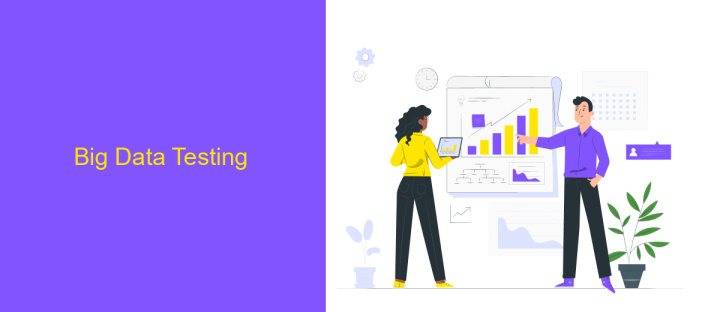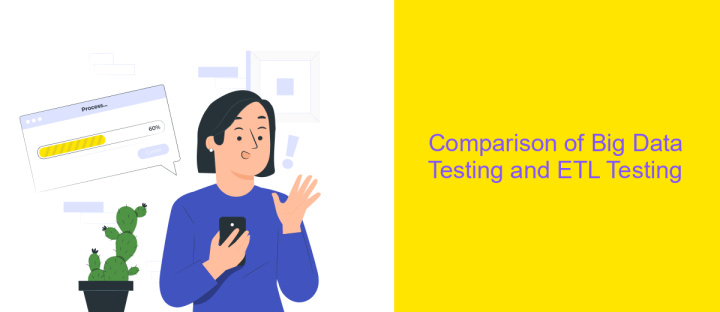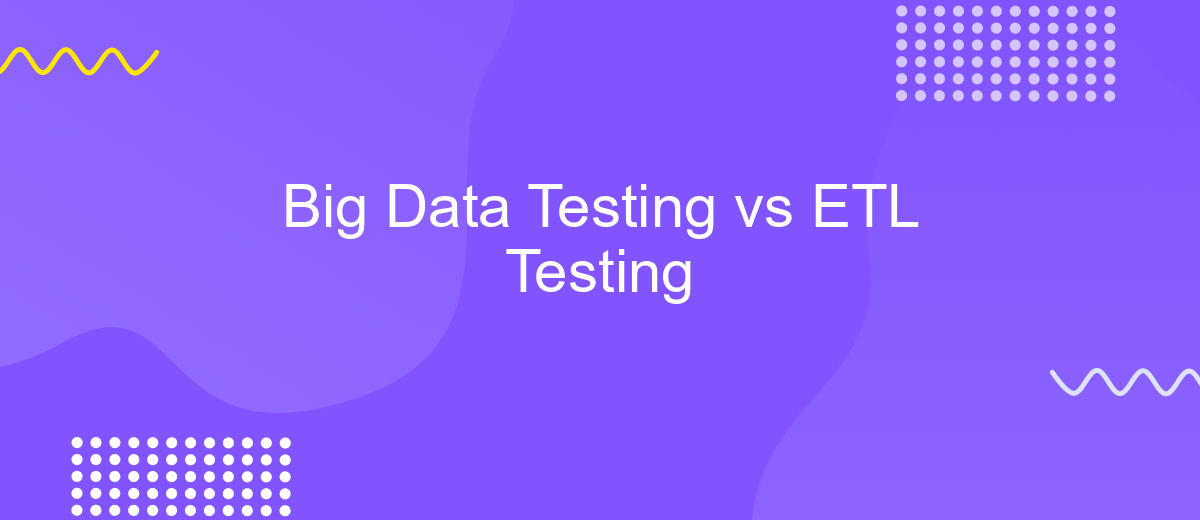Big Data Testing vs ETL Testing
In today's data-driven world, ensuring the accuracy and reliability of data is crucial. Big Data Testing and ETL (Extract, Transform, Load) Testing are two essential processes that help maintain data integrity. While both aim to validate data, they differ significantly in their approaches and applications. This article explores the key differences, methodologies, and best practices for Big Data Testing versus ETL Testing.
Introduction
In the rapidly evolving landscape of data management, understanding the nuances between Big Data Testing and ETL Testing is crucial for ensuring data integrity and quality. Both testing methodologies serve distinct purposes, yet they share common goals of accuracy, consistency, and reliability in data processing.
- Big Data Testing: Focuses on the validation of large volumes of data, often in real-time, ensuring performance and scalability.
- ETL Testing: Emphasizes the accuracy of data extraction, transformation, and loading processes, ensuring data correctness and completeness.
While Big Data Testing deals with massive datasets and complex algorithms, ETL Testing ensures that data workflows are correctly implemented. Tools like ApiX-Drive can facilitate these processes by automating integrations and ensuring seamless data flow between various systems, thereby enhancing the efficiency and reliability of data operations.
Big Data Testing

Big Data Testing involves validating the processing of large datasets to ensure accuracy, performance, and reliability. Unlike traditional testing, it deals with high volume, velocity, and variety of data, often necessitating distributed computing frameworks like Hadoop and Spark. Key aspects include data ingestion testing, data storage validation, and data processing verification. Ensuring data integrity and consistency across different nodes and clusters is crucial, along with verifying the performance of data pipelines and transformations.
Integration tools play a significant role in Big Data Testing. Services like ApiX-Drive facilitate seamless data integration by automating data flows between various applications and databases. This ensures that data is accurately transferred and transformed, reducing manual effort and the risk of errors. ApiX-Drive’s ability to connect disparate systems and automate workflows can significantly enhance the efficiency and reliability of Big Data Testing processes. By leveraging such tools, testers can focus more on validating data quality and less on managing complex integrations.
ETL Testing

ETL Testing, or Extract, Transform, Load Testing, is a critical process in data warehousing and data integration projects. It ensures that the data extracted from various sources is correctly transformed and loaded into the target system without any loss or corruption. This process validates the data at each stage to guarantee its accuracy, completeness, and reliability.
- Data Extraction Testing: Verifies that data is correctly extracted from the source systems.
- Data Transformation Testing: Ensures that the data transformations are performed correctly according to business rules.
- Data Loading Testing: Confirms that the transformed data is accurately loaded into the target system.
- Performance Testing: Assesses the efficiency and speed of the ETL process.
- Data Quality Testing: Validates the accuracy, completeness, and consistency of the data.
To streamline the integration process, services like ApiX-Drive can be utilized. ApiX-Drive facilitates the automation of data flows between different systems, making the ETL process more efficient and less prone to errors. By leveraging such tools, organizations can ensure seamless data integration and maintain high data quality standards.
Comparison of Big Data Testing and ETL Testing

Big Data Testing and ETL Testing are essential components in the data management ecosystem, each serving unique purposes. Big Data Testing focuses on validating large volumes of data, ensuring its accuracy, completeness, and performance across distributed systems. ETL Testing, on the other hand, is concerned with the extraction, transformation, and loading of data from various sources into a data warehouse.
Both testing methods aim to ensure data quality, but they differ significantly in their approaches and tools. Big Data Testing often involves complex algorithms and distributed computing environments, while ETL Testing relies on data integration tools and predefined workflows.
- Scope: Big Data Testing deals with massive datasets, whereas ETL Testing focuses on data pipelines.
- Tools: Big Data Testing uses Hadoop, Spark, etc., while ETL Testing utilizes tools like Informatica, Talend, and ApiX-Drive for integration.
- Complexity: Big Data Testing requires advanced skills in data science, whereas ETL Testing is more about data engineering.
- Performance: Big Data Testing emphasizes scalability and speed, whereas ETL Testing ensures accurate data transformation.
Understanding the differences between Big Data Testing and ETL Testing is crucial for selecting the right approach for your data projects. While they share a common goal of ensuring data integrity, their methods, tools, and complexities vary significantly.
- Automate the work of an online store or landing
- Empower through integration
- Don't spend money on programmers and integrators
- Save time by automating routine tasks
Conclusion
In conclusion, both Big Data Testing and ETL Testing play crucial roles in ensuring the accuracy, performance, and reliability of data systems. While Big Data Testing focuses on handling vast volumes of data and ensuring its integrity across distributed systems, ETL Testing is centered on the process of extracting, transforming, and loading data to ensure it is correctly and efficiently processed. Each approach has its unique challenges and methodologies, but both are essential for maintaining data quality and supporting business intelligence initiatives.
To streamline the integration and automation of these testing processes, tools like ApiX-Drive can be invaluable. ApiX-Drive offers a seamless way to connect various applications and automate workflows, ensuring that data flows smoothly between systems without manual intervention. By leveraging such services, organizations can enhance their testing frameworks, reduce errors, and improve overall data management efficiency. Ultimately, the choice between Big Data Testing and ETL Testing depends on the specific needs and context of the data environment, but both are indispensable for robust data governance.
FAQ
What is the primary difference between Big Data Testing and ETL Testing?
Why is Big Data Testing more complex than ETL Testing?
What tools are commonly used for Big Data Testing?
How can automation be implemented in Big Data Testing and ETL Testing?
What are the key challenges in ETL Testing?
Apix-Drive is a simple and efficient system connector that will help you automate routine tasks and optimize business processes. You can save time and money, direct these resources to more important purposes. Test ApiX-Drive and make sure that this tool will relieve your employees and after 5 minutes of settings your business will start working faster.


